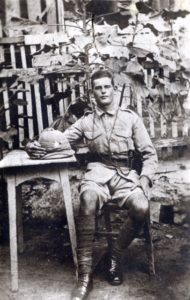Wednesday July 17th, 1918
Third defaulters. Reveille 6:30. Battalion parade. Ditto afternoon. Letter from home. Wrote to A.C. Sutton. Thunderstorm, hail stones 2 inches big. Tents flooded. Had to put Officers’ tents up.
Field Punishment No 1

This form of punishment was introduced when flogging was abolished in 1881. It, together with the lesser Field Punishment No 2, was used extensively during WWI. A court martial could apply the sentence for up to 90 days and a commanding officer for no more than 28 days. The convicted soldier was shackled and tied to an object, he also was subject to additional fatigues and loss of pay.
Illtyd Davies was twice subjected to the punishment. The first was when the officers selected a boggy campsite for their unit. ‘Expressing my thoughts, at this time, on the utter stupidity of the officers, and within their hearing, resulted in me being placed under arrest..’.
He described it as follows. ‘Consequently, for the next fourteen days I spent two hours per day, strapped spreadeagled on a gun wheel, in snow, frost and rain. They also deducted fourteen days’ pay. I had no regrets and felt pleased, in knowing that the officers were aware of the thoughts of the rank and file, expressed by the youngest member of the battery.’¹
The Letter of the Law
The rules for Field Punishment No 1 had been established under Lord Haldane, as Secretary of War, in 1907. The regulation stated:
‘ (a) The offender may be kept in irons … and may be secured so as to prevent his escape.
(b) When in irons he may be attached for a period not exceeding two hours in any one day to a fixed object, but he must not be so attached during more than three out of four consecutive days, nor during more than twenty-one days in all.’
‘Every portion of a field punishment shall be inflicted in such a manner as is calculated not to cause injury or to leave any permanent mark on the offender; and a portion of a field punishment must be discontinued upon a report by a responsible medical officer that the continuance of that portion would be prejudicial to the offender’s health.’²
Sounds okay ‘in theory’. However, in mid-1916 with its civilian soldiers facing the perils of war, the British Army was about to find that ‘in practice’ was a different matter.
13th (Service) Battalion War Diary – 17th July 1918 – Abancourt, France
Companies training (see programme). Battalion Association Football team played 5th Connaught Rangers. Connaughts won 4 to 2.
References & Further Reading
¹ ‘A Little Account’ by Illtyd Davies, from a collection held by the Salonika Campaign Society
² ‘Field Punishment No 1, What it really is’, The Guardian, November 15th, 1916, page 5


